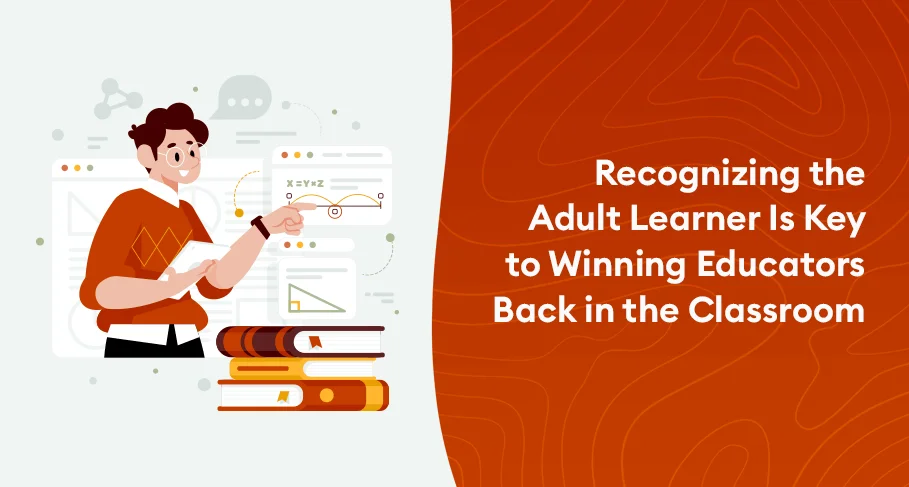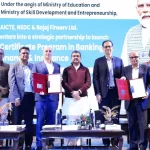Each day, our educators enter their classrooms with full hearts and warm smiles, but behind those smiles looms a pressing concern.
In particular, burnout rates among special educators have skyrocketed, leading to a mass exodus of professionals leaving a field where their impact is immeasurable.
Across 49 states, there is a severe shortage of special education teachers, with 50% succumbing to burnout within just five years and a staggering 75% leaving the field completely within a decade.
As we think about this unsettling trend, we must ask ourselves – why are these educators feeling this level of fatigue, and what can we do to stem this tide?
Addressing this question holds significant implications for the future of education. To ensure these vital educators stay in our classrooms and embrace a career path that is fulfilling, sustainable, and productive, we must prioritize one fundamental principle: treat educators as both the professionals and learners that they are.
Reframing What it Means To Be An Adult Learner
For years, our education system has been singularly focused on arming students with the tools they need for success. However, amidst our dedication to nurturing young minds, we’ve inadvertently sidelined one critical group– the educators themselves.
These adults face high demands, from executive functioning (planning, managing, prioritizing) to working memory (multitasking ability) to processing speed (rapid information retention and application). It’s taxing on special education teachers to juggle tasks, align priorities, and adhere to timelines.
The ever-changing nature of their roles adds another layer. One year, they might teach reading, while the next, they guide a different age group in emotional regulation. This highlights a critical point – the challenge isn’t about competence but rather about managing capacity.
What compounds this issue is the often restrictive nature of teacher preparation programs and alternative pathways that educators must navigate before gaining classroom experience. After educators have completed their training and are working in schools, the usual methods of onboarding and providing ongoing support, often involving lecture-style or ‘sit-and-get’ training, add to their struggle.
Retaining educators depend on enabling them with the required resources to embrace their roles as lifelong learners. Adult learners and educators, in particular, can benefit from relevant learning opportunities that are immediately applicable in real-time scenarios within the classroom.
This includes sticking to the core principles of adult learning, which is delivering meaningful learning experiences. Altering them to the individual needs of students, ensuring they’re action-oriented and presenting them in manageable segments.
This involves adhering to the core principles of adult learning:
- Delivering meaningful learning experiences.
- Tailoring them to their individual needs.
- Making them action-oriented.
- Presenting them in manageable segments.
- This strategy is essential for educators’ professional development, keeping them motivated and building a closer bond with their job, along with episodic learning experiences and social contact.
Increasing Morale by Establishing a Connection, Expertise, and Feeling of Value
Due to the specific skills and responsibilities required for their jobs, special educators sometimes feel isolated and cut off from both the larger educational community and their peers.
Their feelings of isolation are a result of the difficulties they have navigating the complexities of special education standards. The rigorous requirements of due process and compliance strain their workloads.
The solution is to provide a tool and resource environment that empowers special educators to grow, advance their careers, and enjoy what they do. This entails tying their professional obligations (brainwork) and their love for their work (heartwork) together.
Boosting special educators’ morale depends on three key elements. Above all, they must feel appreciated for what they have contributed to the field of education. Acknowledging their unwavering contributions, commitment, and the beneficial influence they have on students’ lives greatly enhances their self-esteem and contentment in their jobs.
It’s also imperative that special educators are acknowledged as authorities in their profession. Acknowledging their proficiency gives them the confidence to take on their duties and validates their significant training and experience. This acknowledgement sparks their sense of pride and achievement and motivates them towards their passion for teaching.
Lastly, special educators must experience a sense of belonging and purpose within the educational community. They might feel deeply fulfilled when they see that their job is a part of a larger goal to improve the lives of kids with special needs.
They are more likely to stay inspired, committed, and passionate about their work when they understand how their efforts fit into the larger picture of education. This relationship acts as a potent source of motivation, guiding people through the industry’s difficulties and enabling them to get greater fulfilment from their jobs.
Bringing the Brain and Heart Work Together
For special educators, the secret is connecting their professional duties, or “brainwork,” with their love of what they do—often called “heartwork.”
Adult education programmes sometimes overload participants with long lists of instructions and steps, emphasizing the “how-to” parts of the material. However, learning gets harder if students don’t think they can accomplish these objectives or know how to use what they’ve learned.
Education has evolved with the advent of technology and is more interactive, personalized, and accessible now. It enables adult learners to customize their educational experiences to fit their needs and interests and access a multitude of information. Regardless of the efficacy of technology, the basic human-to-human bond is still crucial. Higher levels of involvement, capacity, and autonomy in the learning process are made possible by the heart-brain connection.
Future Teachers Will Have Better Connection
It’s time we started a revolution that ensures our educators are recruited and retained while also giving them a sense of value and appreciation for their work. Increasing their self-assurance is essential, as is ensuring they tackle their assignments with readiness and consistent support. Above all, we need to recognize that easily accessible materials and an empathetic comprehension of the difficulties faced by their line of work may create a strong feeling of community and reassure them that they will never travel this route alone.
Let’s acknowledge that teachers—especially those in specialized fields—deserve the same chances for professional development, resources, and support that we give their pupils. We can rekindle the passion that first attracted them to the field by reducing their workload and providing a loving adult learning environment.


